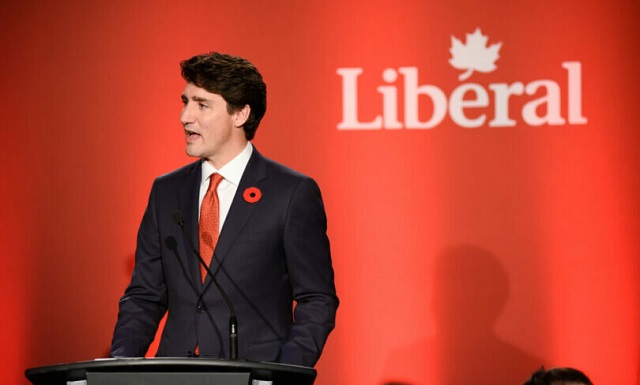Opinion
Budget 2019 – Don’t spend your new Canada Training Credit just yet

On March 19, 2019, the federal government tabled its election-year budget. One of the new provisions is a refundable credit called the Canada Training Credit. However, the $250 credit won’t even be available until you file your 2020 income tax return in April of 2021.
Further, if you are born in 1995 or later, you won’t qualify yet. If you were born in 1954 or earlier, you would never be eligible.
In addition, the maximum benefit you can receive is $5,000 in a lifetime (which will take 20 years to get at $250 a year) and the benefit can only be used to a maximum of 50% of eligible tuition costs.
So let’s consider the following scenario:
It is 2019 – you are 25 years of age making $27,000 a year and file your taxes every year.
You decide to take advantage of this credit and enroll in your first semester of schooling in the fall of 2023.
According to Statistics Canada, the average Canadian undergraduate pays $3,419 per semester.
So, you take time off work to go to school full-time in the fall, thus reducing your income by 1/3 in the year to $18,000.
Under the current 2019 rules, you would only have $39 in federal income tax. This amount is low because the tuition credits reduce your taxes.
By 2023, you have built up a “pool” of $250 per year after you turned 26, and believe you have a $1,000 pool available for that year.
When you file your 2023 return the $1,000 is triggered as a refundable tax credit. But you won’t be getting $961 back ($1,000 – 39).
Here’s the catch:
The $1,000 pool reduces the amount you can claim for tuition credits as well, which changes the tax owing to $189 Federal income tax. Meaning the $1,000 pool that you waited for is reduced by 15% by the time you pay it out.
Cash in jeans: $811.
But what if the course you decided to go into begins in January of 2023? You go for the January-April semester, work from May-August, and attend school September-December.
Using the same $27,000 – your income is now reduced by 2/3 while attending full time. Your income is only $9,000 as a result of the May-August period.
Your tuition (possibly paid through student loans) is $6,838 for the year.
Your tax is now zero because even before tuition credits you are below the Basic Personal Amount in your earnings.
Does this mean you get the full $1,000?
No.
Because your income is less than $10,000 in 2023, you don’t get the $250 for that year. As such, you only get $750, and your tuition credits available for carryforward are reduced by $750 as well, thus having a future negative impact on tax of $112.50.
Net result: $637.50 cash in jeans
What if you are a parent that decides to stay home with the kids until they are in school full time and go back to school in 2023?
Unfortunately, because you did not make more than $10,000 a year in any of the years, you get zero.
What if you were laid off, collecting regular EI benefits, and decide to go back to school?
Regular EI Benefits don’t qualify for the $10,000 income calculation. As a result, unless you had special EI benefits like parental leave or earned income from another source greater than $10,000, you don’t qualify.
What if you were self-employed through a small business corporation and paid yourself dividends instead of wages and then decided to upgrade your training?
Your dividend income does not qualify, and so you are not eligible for amounts to be added to the pool.
So assuming you qualify, and you wait the four years to build up a pool of $1,000 (remember that the $1,000 is only a net $850 because of the reduction in tuition credits). That same Statistics Canada report says that tuition is increasing at 3.3% per year. That means by you waiting four years so you can get the Net $850 means your annual tuition has likely increased from $6,838 to $7,786 ($948).
You waited four years, and the tax amount you receive won’t even cover the inflationary price increase on tuition.
In Conclusion
- Those that do qualify won’t see anything until April 2021; the actual net amount of what they will see is only $212.50; and their annual tuition will likely have increased by $225.65.
- Students under the age of 25 will see nothing;
- People over the age of 25 that don’t have more than $10,000 of income will see nothing;
- Seniors will see nothing;
- Parents looking to re-enter the workforce will see nothing; and
- People who have been laid off and have less than $10,000 of non-EI income will see nothing.
Seems like a lot of complex legislation for nothing.
—
Cory G. Litzenberger, CPA, CMA, CFP, C.Mgr is the President & Founder of CGL Strategic Business & Tax Advisors; you can find out more about Cory’s biography at http://www.CGLtax.ca/Litzenberger-Cory.html
National
Anger towards Trudeau government reaches new high among Canadians: poll

From LifeSiteNews
A recent Nanos research survey found that ‘Pessimism and anger remain the top emotions Canadians say best describe their views of the federal government in Ottawa.’
Canadians’ anger towards Prime Minister Justin Trudeau and his Liberal government has reached a record high, according to a new poll.
According to a national survey published by Nanos Research this month, 31% of Canadians feel anger and pessimism towards the Trudeau government, which marks an all-time low in satisfaction for government leadership.
“Which of the following feelings best describes your views of the federal government in Ottawa?” the poll questioned.
In addition to the 31% feeling angry and pessimistic respectively, 11% feel uninterested, while only 1% and 10% feel satisfaction and optimism, respectively. 6% were unsure of their feelings towards the Trudeau government.
“Feelings of anger toward the federal government have increased or held steady in every region, with the largest increases among residents of Quebec (December: 12%; March: 24%) and Atlantic Canada (December: 21%; March: 38%). Pessimism and anger remain the top emotions Canadians say best describe their views of the federal government in Ottawa,” the research found.
In recent months, Trudeau’s popularity has plummeted, with polls projecting a massive Conservative victory in the upcoming election.
Trudeau’s popularity has been falling and his government has been embroiled in scandal after scandal, one of the latest being a federal court ruling that the prime minister’s use of the Emergencies Act to end the 2022 Freedom Convoy was “not justified.”
Even top Liberal party stalwarts have called for him to resign.
Indeed, Canadians anger and dissatisfaction with Trudeau has become a topic of conversation on many social media platforms, with Canadians detailing how the Trudeau government has made their life less affordable.
Numerous videos are being uploaded to social media by Canadians explaining that they struggling to make ends meet amid the rising cost of living and Trudeau’s ever-increasing carbon tax, while many immigrants are telling others not to come to Canada.
Frontier Centre for Public Policy
Budget 2024 as the eve of 1984 in Canada

From the Frontier Centre for Public Policy
Those who claim there are unmarked burials have painted themselves into a corner. If there are unmarked burials, there have had to be murders because why else would anyone attempt to conceal the deaths?
The Federal Government released its Budget 2024 last week. In addition to hailing a 181% increase in spending on Indigenous priorities since 2016, “Budget 2024 also proposes to provide $5 million over three years, starting in 2025-26, to Crown-Indigenous Relations and Northern Affairs Canada to establish a program to combat Residential School denialism.” Earlier this spring, the government proclaimed:
The government anticipates the Special Interlocutor’s final report and recommendations in spring 2024. This report will support further action towards addressing the harmful legacy of residential schools through a framework relating to federal laws, regulations, policies, and practices surrounding unmarked graves and burials at former residential schools and associated sites. This will include addressing residential school denialism.
Like “Reconciliation,” the exact definition of what the Federal government means by “residential school denialism” is not clear. In this vague definition, there is, of course, a potential for legislating vindictiveness.
What further action is needed to address “the harmful legacy of residential schools” except to enforce a particular narrative about the schools as being only harmful? Is it denialism to point out that many students, such as Tomson Highway and Len Marchand, had positive experiences at the schools and that their successful careers were, in part, made possible by their time in residential school? If the study of history is subordinated to promoting a particular political narrative, is it still history or has it become venal propaganda?
Since the sensational May 27, 2021, claim that 215 children’s remains had been found in a Kamloops orchard, the Trudeau government has been chasing shibboleths. The Kamloops claim remains unsubstantiated to this day in two glaring ways: no names of children missing from the Kamloops IRS (Indian Residential Schools) have been presented and no human remains have been uncovered. For anyone daring to point out this absence of evidence, their reward is being the target of a witch hunt. As we recently witnessed in Quesnel, B.C., to be labeled as a residential school denialist is to be drummed out of civil society.
If we must accept a particular political narrative of the IRS as the history of the IRS, does our freedom of conscience and speech have any meaning?
To the discredit of the Truth and Reconciliation Commission, fictions of missing and murdered children circulating long before the Commission’s inception were subsumed by the TRC (Truth and Reconciliation Commission). Unmarked graves and burials were incorporated into the TRC’s work as probable evidence of foul play. In the end, the TRC found no evidence of any murders committed by any staff against any students throughout the entirety history of the residential schools. Unmarked graves are explained as formerly marked and lawful graves that had since become lost due to neglect and abandonment. Unmarked burials, if they existed, could be construed as evidence of criminal acts, but such burials associated with the schools have never been proven to exist.
Those who claim there are unmarked burials have painted themselves into a corner. If there are unmarked burials, there have had to be murders because why else would anyone attempt to conceal the deaths? If there are thousands of unmarked burials, there are thousands of children who went missing from residential schools. How could thousands of children go missing from schools without even one parent, one teacher, or one Chief coming forward to complain?
There are, of course, neither any missing children nor unmarked burials and the Special Interlocutor told the Senate Committee on Indigenous People: “The children aren’t missing; they’re buried in the cemeteries. They’re missing because the families were never told where they’re buried.”
Is it denialism to repeat or emphasize what the Special Interlocutor testified before a Senate Committee? Is combating residential school denialism really an exercise in policing wrongthink? Like the beleaguered Winston in Orwell’s 1984, it is impossible to keep up with the state’s continual revision of the past, even the recent past.
For instance, the TRC’s massive report contains a chapter on the “Warm Memories” of the IRS. Drawing attention to those positive recollections is now considered “minimizing the harms of residential schools.”
In 1984, the state sought to preserve itself through historical revision and the enforcement of those revisions. In the Trudeau government’s efforts to enforce a revision of the IRS historical record, the state is not being preserved. How could it be if the IRS is now considered to be a colossal genocide? The intent is to preserve the party in government and if it means sending Canada irretrievably down a memory hole as a genocidaire, so be it.
Michael Melanson is a writer and tradesperson in Winnipeg.
-

 Business1 day ago
Business1 day agoDon’t be fooled by high-speed rail
-

 Addictions1 day ago
Addictions1 day agoBritish Columbia should allow addicts to possess even more drugs, federal report suggests
-

 Business1 day ago
Business1 day agoUN plastics plans are unscientific and unrealistic
-

 Alberta1 day ago
Alberta1 day agoAlberta rejects unconstitutional cap on plastic production
-

 Also Interesting1 day ago
Also Interesting1 day agoIs the Anger Toward Fiat Currency Justified?
-

 Censorship Industrial Complex1 day ago
Censorship Industrial Complex1 day agoAustralian politicians attack Elon Musk for refusing to remove video of Orthodox bishop’s stabbing
-

 Alberta1 day ago
Alberta1 day agoActivity-Based Hospital Funding in Alberta: Insights from Quebec and Australia
-

 Fraser Institute1 day ago
Fraser Institute1 day agoCanadians should decide what to do with their money—not politicians and bureaucrats






